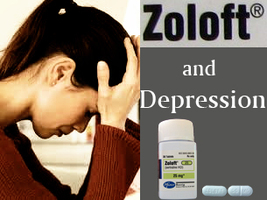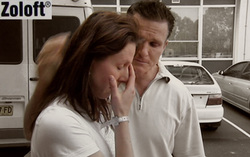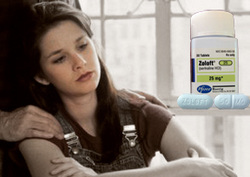
Zoloft Depression
Recent research shows that differing personalities in mice give insight into human depression. A psychologist at the University of the Basque Country, Eneritz Gomez, discovered that humans and mice have a common response toward depression The results of her study provide valuable clues in knowing how humans deal with depression symptoms and life-threatening behaviors like suicide The study illustrated how coping with stress varies from person to person.
According to Gomez, “not all living things possess adequate coping skills, which can often lead to depression.”
She is hoping that “the findings will provide the information needed to devise more specialized treatments for depression.”
Depression is ruminated as a brain disorder, according to medical research Its causes could be from psychological, genetic, environmental and biochemical factors, like drug and alcohol intake.
According to the World Health Organization (WHO), the criteria for depression include fatigue, migraines, digestive problems, social withdrawal, and reduced sex drive.
Depression May be Life-altering
Another case of antidepressant-related suicide was reported in August 2011 Wade Belak, a retired 35-year-old National Hockey League player was found lifeless in a Toronto hotel apparently from suicide. He was a retired National Hockey League player An article in the Globe and Mail revealed that his mom knew of Belak battling depression and taking antidepressant drugs The real reason for the suicide remained unknown.
In an article from Medical Publishing’s Prescription Medicines, Side Effects and Natural Alternatives, a jury in Wyoming conformed that Zoloft, an antidepressant drug, caused a man to kill his wife, daughter and granddaughter before killing himself in June 2001. An amount of $8 million in damages were given to the family of the victims.
When put into therapy after their suicide attempts, most patients claim they do so while “trying to escape from a situation that seemed impossible to deal with or to get relief from really bad thoughts or feelings.” In other words, they were suffering from depression.
According to Gomez, “not all living things possess adequate coping skills, which can often lead to depression.”
She is hoping that “the findings will provide the information needed to devise more specialized treatments for depression.”
Depression is ruminated as a brain disorder, according to medical research Its causes could be from psychological, genetic, environmental and biochemical factors, like drug and alcohol intake.
According to the World Health Organization (WHO), the criteria for depression include fatigue, migraines, digestive problems, social withdrawal, and reduced sex drive.
Depression May be Life-altering
Another case of antidepressant-related suicide was reported in August 2011 Wade Belak, a retired 35-year-old National Hockey League player was found lifeless in a Toronto hotel apparently from suicide. He was a retired National Hockey League player An article in the Globe and Mail revealed that his mom knew of Belak battling depression and taking antidepressant drugs The real reason for the suicide remained unknown.
In an article from Medical Publishing’s Prescription Medicines, Side Effects and Natural Alternatives, a jury in Wyoming conformed that Zoloft, an antidepressant drug, caused a man to kill his wife, daughter and granddaughter before killing himself in June 2001. An amount of $8 million in damages were given to the family of the victims.
When put into therapy after their suicide attempts, most patients claim they do so while “trying to escape from a situation that seemed impossible to deal with or to get relief from really bad thoughts or feelings.” In other words, they were suffering from depression.
Studies Associate Antidepressant Use to Suicides
The US Food and Drug Administration in 2005 has mandated public health advisories stating that taking antidepressant drugs can incite suicidal thoughts. These warnings were considered too late for the victims of Zoloft The FDA additionally asked the manufacturers to clearly attach explicit label cautions about the antidepressant’s harmful side effects, including the risk of suicide.
Evaluating results from 372 studies about antidepressant drugs, the FDA discovered that they may cause children and teenagers to be suicidal, violent, hostile and irrational. The FDA directed antidepressant manufacturing companies to place a “black box” warning to the drug Black box warnings are issued if the medication carries the risk of a fatal, life-threatening, or permanently-disabling side effect.
In addition to these warnings and reviews, medical reports from patients also include complaints about the negative side effects of the drug This urged them to file Zoloft lawsuit against Pfizer, its drug manufacturer.
References:
nlm.nih.gov/medlineplus/depression.html
webmd.com/depression/news/20070502/new-antidepressant-suicide-warning
mcmanweb.com/FDA_suicide.htm
washingtonpost.com/wp-dyn/content/article/2006/12/13/AR2006121300452.html
naturalnews.com/019342.html
The US Food and Drug Administration in 2005 has mandated public health advisories stating that taking antidepressant drugs can incite suicidal thoughts. These warnings were considered too late for the victims of Zoloft The FDA additionally asked the manufacturers to clearly attach explicit label cautions about the antidepressant’s harmful side effects, including the risk of suicide.
Evaluating results from 372 studies about antidepressant drugs, the FDA discovered that they may cause children and teenagers to be suicidal, violent, hostile and irrational. The FDA directed antidepressant manufacturing companies to place a “black box” warning to the drug Black box warnings are issued if the medication carries the risk of a fatal, life-threatening, or permanently-disabling side effect.
In addition to these warnings and reviews, medical reports from patients also include complaints about the negative side effects of the drug This urged them to file Zoloft lawsuit against Pfizer, its drug manufacturer.
References:
nlm.nih.gov/medlineplus/depression.html
webmd.com/depression/news/20070502/new-antidepressant-suicide-warning
mcmanweb.com/FDA_suicide.htm
washingtonpost.com/wp-dyn/content/article/2006/12/13/AR2006121300452.html
naturalnews.com/019342.html



 RSS Feed
RSS Feed